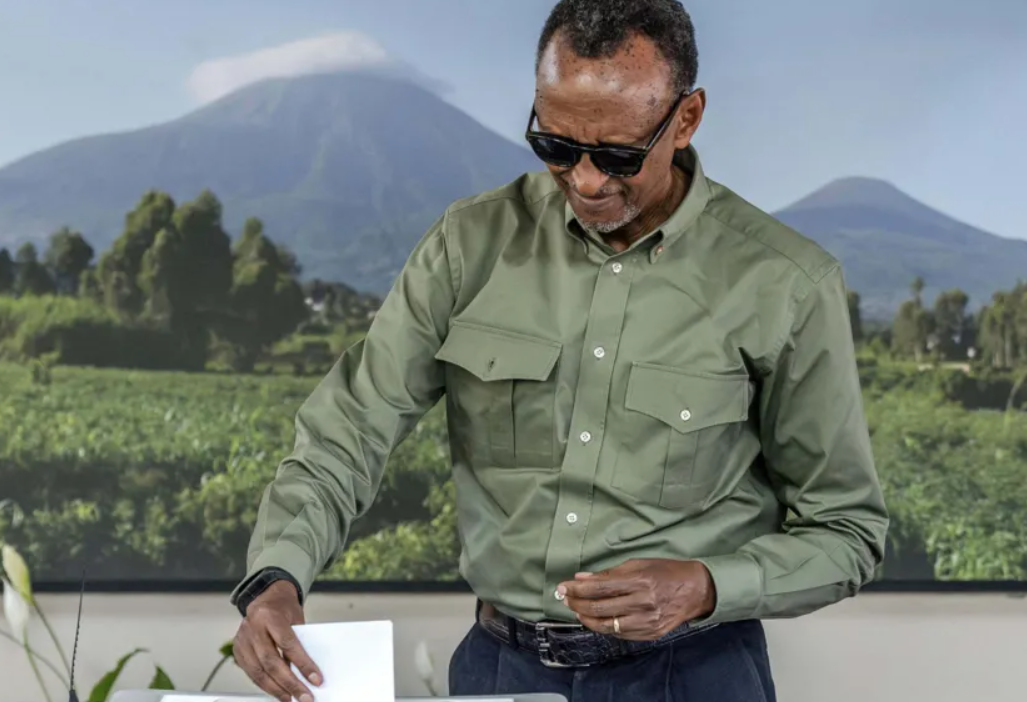According to the electoral commission, Rwandan President Paul Kagame has a commanding lead in the most recent election and is almost certain to extend his 24-year rule. With around 79% of ballots counted, preliminary figures indicate that Kagame received 99.15% of the vote.
Due to the restriction on significant opposition individuals, Kagame encountered very no opposition despite being 66 years old. Philippe Mpayimana, a former journalist, and Frank Habineza, an environmentalist, received only 0.32 and 0.53 percent of the vote, respectively, in their respective campaigns against him.
At the Rwandan Patriotic Front (RPF) headquarters, Kagame spoke on the importance of the faith displayed by the electorate and expressed gratitude for the tremendous support. Regardless of the percentage, these are still not just figures. “What matters most is that they demonstrate trust,” Kagame said.
Full provisional results should be available by July 20, and final results should be available by July 27. These statistics are very similar to those of the 2017 election when Kagame received 98.8 percent of the vote in opposition to the identical candidates.
Three people were removed from the race due to ineligibility, one of which was Diane Rwigara, a vocal opponent. Over nine in ten eligible voters cast ballots, according to the Electoral Commission. In addition to choosing a president, Rwandans also chose 53 representatives for the legislature. On Tuesday, there will be additional elections for 27 special seats reserved for women, youth, and individuals with disabilities.
Following the 1994 genocide, Kagame assumed the presidency in 2000 and became the de facto leader of Rwanda. His backers say he helped the economy thrive and brought people together across ethnic lines, while rights activists say he curbed their freedoms.
This election further proves that the majority of Rwandans still favor Kagame and that he has a firm hold on power. Regardless of the naysayers, his leadership has changed Rwanda’s political and social climate for the better, setting the country up for long-term growth and stability.
The Political Scene in Rwanda and Kagame’s Impact
When the Rwandan Patriotic Front (RPF) he commanded succeeded in toppling the genocidal government in 1994, Paul Kagame’s climb to power could begin. After that, Kagame became the president of Rwanda in 2000 and has since been an influential player in the country’s affairs.
There has been tremendous economic growth and progress in Rwanda during Kagame’s leadership. In an area where violence is common, the country has emerged as an example of tranquility. Thanks to improvements in infrastructure, healthcare, and education, Rwanda has become one of the fastest-growing countries in Africa under Kagame’s government.
Nevertheless, there has been criticism surrounding Kagame’s term. His administration is facing accusations from human rights groups for allegedly stifling free expression, repressing opposition, and manipulating the political process to stay in power. According to his detractors, under Kagame’s leadership, there has been an atmosphere of fear and an absence of true political opposition.
Notwithstanding these complaints, Kagame continues to have widespread support among Rwandans who see his leadership as essential to the development of their nation. The massive election victories he has and will continue to achieve are evidence of the enormous support he has received for his efforts to keep the peace and propel development in Rwanda.
The Future of Rwanda Under Kagame
Sustaining Rwanda’s economic growth and tackling the issues that come with it will undoubtedly be the focus as Kagame begins another five-year tenure. As the world weighs its plaudits for Rwanda’s progress against its concerns about political liberties, it will keep an eye on his government’s human rights record.
People will continue to argue over Kagame’s leadership style and whether or not it has delivered stability to Rwanda. How well the president handles these challenges will determine Rwanda’s course in the future. It is uncertain if Kagame can promote a more inclusive political climate while maintaining his focus on driving economic growth.
Right now, Rwanda is at a crossroads. In the years to come, the course of the country will be defined by the balance it strikes between growth, stability, and political freedom as it continues to progress under Kagame’s leadership.


















